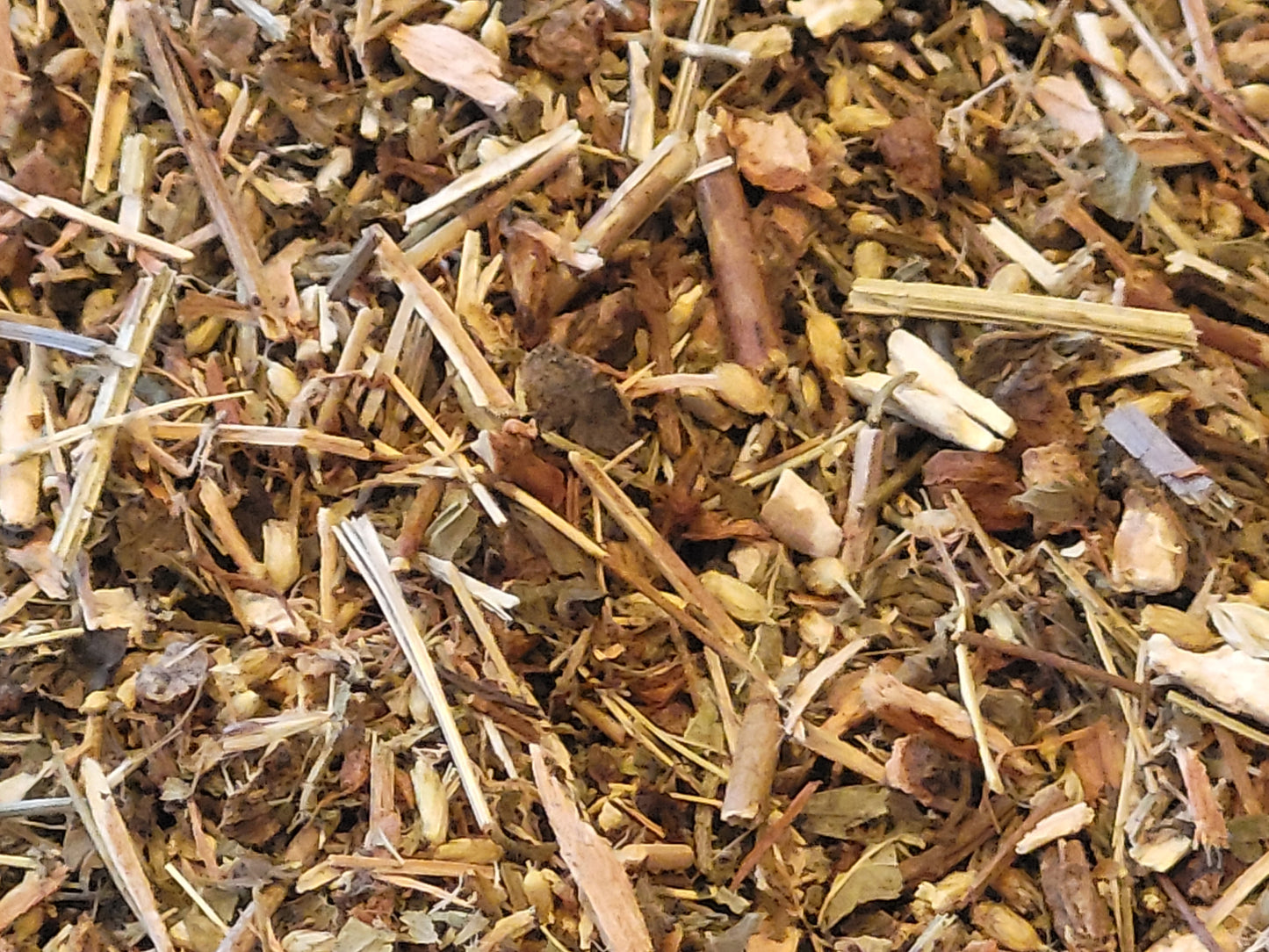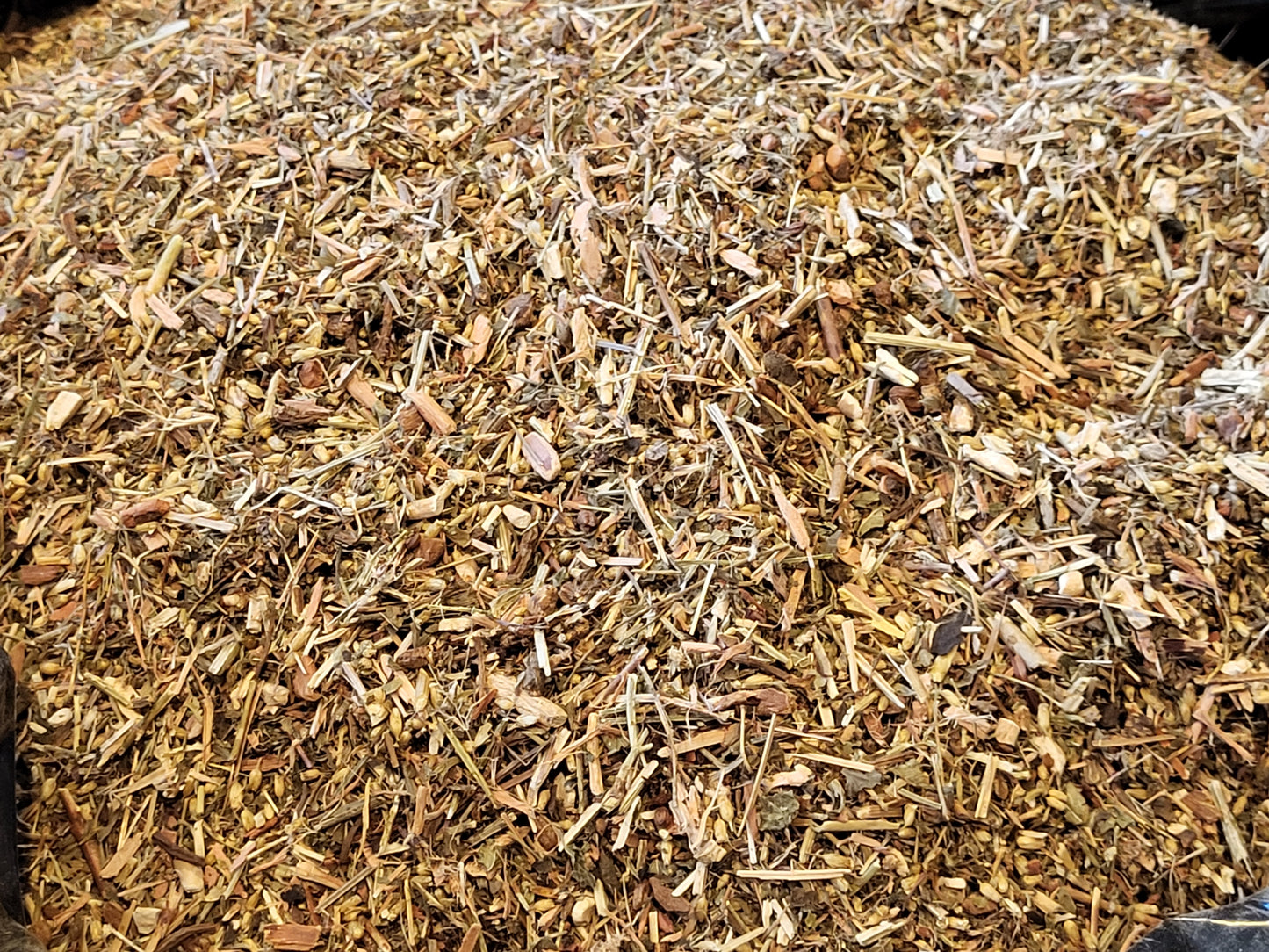My Store
HAPPY "Medicinal Tea" St Johns Wort, Angelica Root, Blue Vervain, Lemon Balm, Whit Willow Bark, Yarrow Flowers, Ashwagandha Root Organic - 12 ounce SHIPS FREE
HAPPY "Medicinal Tea" St Johns Wort, Angelica Root, Blue Vervain, Lemon Balm, Whit Willow Bark, Yarrow Flowers, Ashwagandha Root Organic - 12 ounce SHIPS FREE
Couldn't load pickup availability
***For more REAL and in-depth info on how this product can benefit you, visit our Instagram @beenefamilyfarm or our Facebook page, Lil Patch of Heaven. The info below is a generalized glimpse of this item, but there is so much more to our products that we cannot post here.***
Product Description:
12 ounce container of our premium medicinal tea blend
Key Features:
- Premium Ingredients: Crafted with carefully selected high quality herbs
- No Artificial Additives: Free from artificial colors, flavors, and preservatives.
Directions for Use:
- It's important when making tea you understand not to boil your herbs none of these are Roots so you're not going to want to boil them in water what you're going to want to do is get your tea kettle or pot to a rolling boil pull it off the stove then add some of your herbs in there as much to your liking you could do a small amount like a teaspoon you can add a quarter cup it's all up to you let it steep pretend to 15 minutes so that you get the full medicinal benefit now it is quite common that the body likes a cold tea more than a hot tea so don't drink it super hot make sure it's cooled down.
Ingredients:
St. John's Wort (Hypericum perforatum)
Mild to moderate depression: Studies suggest St. John's Wort may be as effective as some standard antidepressants for mild to moderate depression, though not for severe cases. It is believed to work by increasing neurotransmitters like serotonin, dopamine, and norepinephrine.
Menopause symptoms: It may help reduce symptoms of menopause, including hot flashes, and potentially relieve emotional and physical symptoms.
Anxiety and stress: Research indicates it can help with anxiety, tension, stress, and associated sleeping problems (insomnia).
Skin conditions: Applied topically, St. John's Wort can help heal minor wounds, burns, and skin irritations, and has shown promise for conditions like eczema and psoriasis.
- Digestive health: Angelica root can stimulate appetite, improve digestion by promoting the secretion of gastric juices, and has a relaxant effect on the gastrointestinal tract.
- Women's health: Different species have been used in traditional medicine for treating gynecological issues like menstrual pain (dysmenorrhea) and menopausal symptoms.
- Anti-inflammatory: Angelica oil and other compounds demonstrate anti-inflammatory properties.
- Nervous system: Some types of angelica have calming, anti-anxiety, and neuroprotective properties.
- Circulation: It is believed to support healthy blood circulation, particularly to the extremities.
- Nervous system: Often used as a nervine to calm the central nervous system, it can help with anxiety, stress, and insomnia.
- Digestive support: The bitter compounds in vervain stimulate appetite and digestion.
- Lactation: Traditionally used to stimulate breast milk flow.
- Anti-inflammatory: Vervain possesses anti-inflammatory and antioxidant properties.
- Anxiety and stress: Known for its calming effects, lemon balm can help alleviate stress and mild anxiety.
- Sleep: Its anti-anxiety properties can aid in improving sleep, especially occasional insomnia linked to stress.
- Cognitive function: Some research suggests it can enhance mood and cognitive abilities, including memory and concentration.
- Digestive issues: As an antispasmodic, it can help relieve mild digestive problems like gas and indigestion.
- Cold sores: Applied topically, lemon balm has antiviral properties that can help treat cold sores caused by the Herpes simplex virus.
- Pain and inflammation: Containing salicin (a chemical similar to aspirin), willow bark has analgesic and anti-inflammatory effects. It has been used to treat headaches, fever, and pain from conditions like low back pain and osteoarthritis.
- Anti-inflammatory properties: It can inhibit pro-inflammatory agents, which may contribute to its effectiveness.
- Skin health: Used in skincare for its antibacterial and anti-inflammatory properties, it can help with issues like acne, irritation, and large pores.
- Fever reduction: Traditionally used to reduce fevers.
- Wound healing: Yarrow has astringent properties that can help stop bleeding and promote the healing of cuts, scrapes, and bruises.
- Anti-inflammatory: It contains anti-inflammatory compounds that can help with conditions like arthritis, skin rashes, and respiratory issues.
- Fever and cold symptoms: Traditionally used to promote sweating to help "break" a fever and to relieve cold and flu symptoms.
- Digestive aid: As a bitter herb, yarrow can stimulate digestion.
- Relaxation: Yarrow also acts as a mild sedative and nervine, helping to ease anxiety and promote restful sleep.
- Stress and anxiety: As an adaptogen, ashwagandha helps the body manage stress and has been shown to reduce anxiety levels and serum cortisol (a stress hormone).
- Sleep: Research indicates it can improve overall sleep and sleep quality.
- Cognitive function: Some studies suggest it can enhance memory, attention, and other cognitive functions.
- Physical performance: It may help improve muscle strength, cardiorespiratory endurance, and muscle recovery.
- Thyroid health: Some evidence suggests it may support thyroid function in individuals with hypothyroidism.
- Anti-inflammatory: Ashwagandha possesses anti-inflammatory properties that may help with conditions like rheumatoid arthritis and osteoarthritis.
Disclaimer:
This product has not been evaluated by the Food and Drug Administration (FDA). It is not intended to diagnose, treat, cure, or prevent any disease. Consult with your healthcare provider before using this product, especially if you are pregnant, nursing, taking medication, or have a medical condition.
Prop65 Warning: This product can expose you to chemicals which are known to the State of California to cause cancer and birth defects or other reproductive harm.
For more information, go to www.P65Warnings.ca.gov.
Share




